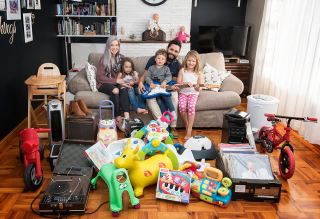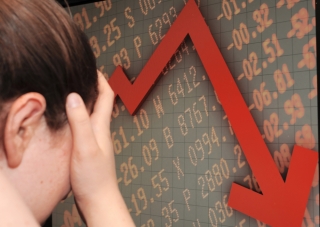Your ‘junk’ could be your holiday ticket
OLX social experiment unlocks cash and declutters
A recent social experiment by SA’s leading online classified platform, OLX has highlighted that most South African households have money ‘tied up’ in unwanted goods.
The social experiment surveyed six households and identified unloved and unused items valued at over forty thousand rand which were catalogued and appraised by a professional valuator. In all cases owners were surprised by the combined value of the household items, and given the current economic climate it came as welcome news.
The weakening rand against the dollar and recent petrol price hikes will have a knock-on effect on consumer goods pricing meaning that consumers will feel the pinch this festive season. So OLX set out to prove that most households could dispose of unwanted goods to stretch their wallets for the holidays.
“We live in a material world and recent reports from financial and academic institutions show that consumers are more cash strapped than previous generations and less able to fund their families’ aspirations (Unilever Aspirations study). Always resilient, the current situation is forcing South Africans to become creative in how they make their salaries stretch. Buying less is the obvious solution, but selling your unwanted items or buying second hand is probably the easiest way to save money,” says Karla Levick, head of marketing for OLX.
One of the participants, Cindy Alfino, is married with three kids, owns an insurance brokerage and writing weekly for her parenting blog. The combined value of unwanted items in her household was R6 400 which they spent on camping equipment for the family’s holiday. Camping is an affordable holiday option for this season, offering even more value for money if you buy second hand equipment online.
The simple insight is that your money could be gathering dust in the back of a cupboard without you realising it. This experiment shows how you can simplify your life, clear up space and make cash which can then be put to use. “It’s like finding cash in a jacket you haven’t worn for a while” says Levick.
Ntsikakazi Hene, a brand manager plans to put the R4 650 she made from selling her unloved items towards her December holiday travels. “For the last 7 years, I have spent every celebrated New Years in Cape Town. I want something different this year, but still, a want to be at the beach. So the plan is to go to Thailand for a week. Apart from the flights and accommodation, I also need money for shopping (apparently Thailand is a shopping haven). It's such a lovely surprise to see how much money, I can make from the items I never use! Now I can put away my credit card, and use the money I made from selling on OLX.”
Jurie Senekal, a professional photographer and his girlfriend Mariska, a food stylist, plan to spend the R15 000 they will make on buying camera equipment. “R15 000 will help me to buy more up-to-date equipment. Also, previously the old equipment would just gather dust and it would also cost more as it is specified in our household insurance – so I would pay for cover for items we don’t use,” says Jurie.
The South African classifieds market is estimated at R7 billion per annum of the entire retail sector worth R707 billion (as per 2014 statistics provided by www.statssa.go.za). With households under pressure, consumer spending will be restrained with a change in shopping habits and consumers looking for bargains. Classifieds companies, like OLX expect to see a spike in the market share of online classifieds. “We believe that consumers are cottoning onto the benefits of classifieds shopping with thrifty behaviour as a long-term result,” says Levick.
The results of the experiment are not surprising, says Gerald Mwandiambira, acting CEO of the South African Savings Institute: “In the age of consumerism where people spend more than their means and live on credit to buy goods and services they don’t need, clutter (in the form of unused items) is the result. What most people don’t realise is that selling items they have standing around could help them get out of debt, save or pay for something they really need. Part of the debt restorative process is also to de-clutter your life and focus on a financial plan. As part of the budgeting process, selling unused goods often allows one to pay off debt. Many people have old cellphones, gadgets and appliances that can be used to free space and release cash. Many people end up asset rich and cash poor when they hang on to unwanted goods.”
“So the tough economic outlook should not entirely dampen the festive spirit. Consumers can be creative, dispose of unwanted goods and look for bargains when shopping for gifts, and what better place to shop than OLX?” says Levick.
More about OLX
OLX is the world's leading classifieds platform focused on high growth markets, both mobile and online, with over 300 million monthly users across 45 countries. It generates traffic of over 28 billion monthly page views or around 360 million page views per day.
The story of OLX begins in the valleys of El Calafate in Argentina, far from the suburbs of Silicon Valley, where two young Internet pioneers Fabrice Grinda and Alec Oxenford connected, roamed and dreamed. They both loved IT and frequented the newspaper classifieds, and saw in them the potential of mobile technology. Their vision was to create something significant enough to make a positive difference in millions of people's lives, and so OLX was born. OLX currently employs over 2000 passionate and committed people across 25 offices globally, and as the organization continues to grow, so will its ability to deliver on its original promise: to create a richer world.
Contact details: Karla Levick, Head of Marketing Mobile: 078 205 8642 Email: This email address is being protected from spambots. You need JavaScript enabled to view it.
Millennials - Lose Money in the Right Ways and for the Right Reasons
Is there a right way to lose money? Or should we ask whether there is a right reason to lose money? Both questions get a big fat YES! They are right ways and reasons to lose money. Provided you are aware of the wrong ways and reasons too. Let’s face it, there are countless challenges that come with being a millennial and money is at the top of this list. Before we delve into how to lose money in the right ways and for the right reasons.
Let’s look at a few key-points from the economic review of our beloved country:
- According to the recent World Economic Outlook (WEO) by the International Monetary Fund (IMF) South Africa is now the third-largest economy on the African continent. Surrendering its second place to Egypt and Nigeria remains in the number one spot.
- The rand weakened from an average of R8.20/$ during 2012 to an average of R12.74/$ in 2015. On Tuesday, 17 May 2016 at 13:03 the rand was trading at R15.68 to the dollar.
- The rand remains below successive support levels suggesting a continuation in the rand’s depreciation.
- In a Bloomberg survey 12 out of 13 economists expect Standard & Poor’s (S&P) credit rating agency to cut SA’s sovereign debt rating to sub-investment grade (junk status) by the end of the year.
- Despite the recent price rally Brent crude’s break below the key $30 support level in February suggests a continuation of the weakening long-term trend to a downside $25 target.
- Gold has broken its recent downtrend by rising decisively above the $1 100 resistance level. An extended break above $1 250 is needed to confirm the end of gold’s bear market.
- The JSE All Share index is up +12% from its lows in early January and appears dramatically over-priced on a price-earnings (PE) multiple of 21.2x around 40% above its 14.8x long-term average.
View/download the full Overberg Market Report - http://www.overberg.biz/pdf/Overberg%20Market%20Report%2010th%20May%202016.pdf
South Africa is facing continuous food, fuel and electricity price hikes that make the cost of living higher each month. So, ask yourself will you and your loved ones be financially secure if the economy continues to depreciate? Or worse, if we were to hit a recession? If your answer is no or maybe and not a definite yes, then you have your answer.
You need to get the best financial education immediately on what’s available out there for you to take advantage of; whilst there’s still time. The National Treasury introduced Tax Free Savings Accounts a year ago. If you are unaware of this visit your nearest bank or life insurance company for more info.
If this is not the route you would like to take. Take the stock market investment route. Do some comparative research on various funds especially looking at fund performances before you choose one that aligns with your financial goals, needs and pocket.
The Overberg Market report is an indicator of the economic times we live in. Economic times which urge millennials to look into their personal finances and start saving from as early as possible. Millennials need to get into the habit of losing money in the form of savings plans and investment portfolios. Now is the time to be proactive.



